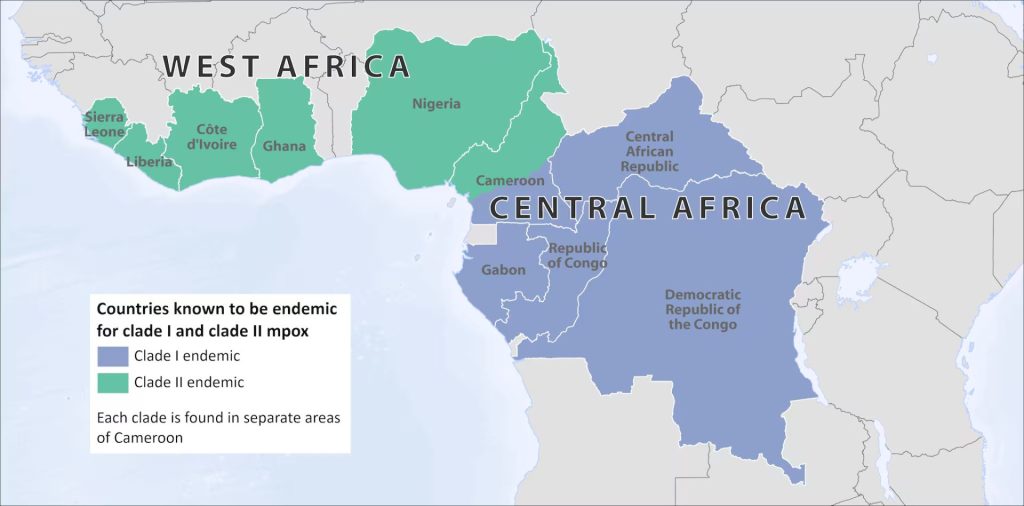Do you know what mpox viral infection is?

How to protect yourself?
Mpox is a rare viral infection caused by the mpox virus. Although the disease was first identified in laboratory monkeys, it primarily affects humans and is endemic to parts of central and western Africa. The illness can present with flu-like symptoms and a distinctive rash, and understanding its nature and prevention methods is crucial for public health.
On August 13, 2024, the Africa Centres for Disease Control and Prevention (Africa CDC) elevated mpox to a Public Health Emergency of Continental Security (PHECS). The World Health Organization (WHO) followed suit the next day, declaring mpox a Public Health Emergency of International Concern (PHEIC) for the second time in two years.

Africa CDC and the WHO are working with concerned countries, facilitating information sharing and supporting surveillance, testing, infection prevention, clinical management, risk communication, and community engagement regarding the ongoing mpox outbreak.
Mpox history
The mpox virus was first identified in 1958 during two outbreaks of a pox-like illness among research monkeys. Despite the earlier name ‘monkeypox, the exact source of the virus remains uncertain. Scientists believe that African rodents and non-human primates, such as monkeys, may carry the virus and transmit it to humans.
The first recorded human case of mpox occurred in 1970 in what the Democratic Republic of the Congo (DRC) is now. Before 2022, cases outside Africa were rare and typically linked to travel or the importation of animals from regions where the disease is endemic.

In 2022, the WHO updated the disease’s name from ‘monkeypox’ to ‘mpox’ to adhere to contemporary naming guidelines. These guidelines aim to avoid offending cultural, social, national, regional, professional, or ethnic groups and to reduce negative impacts on trade, travel, tourism, or animal welfare. However, the virus’s historical name remains unchanged.
Virus types
There are two main types of the mpox virus: clade I and clade II.
- Clade I is associated with more severe illness and has historically had higher mortality rates, with some outbreaks causing up to 10% fatality, though recent cases have seen lower death rates. This clade is endemic to Central Africa.
- Clade II is responsible for the global outbreak that began in 2022. Infections from this clade are less severe, with a survival rate of over 99.9%. Clade II is endemic to West Africa.
Mpox presents various symptoms, including fever, headache, muscle aches, and swollen lymph nodes. These symptoms are often followed by a rash that typically begins on the face and spreads to other body parts.

The rash progresses through several stages, eventually forming scabs before healing. In severe cases, mpox can lead to complications such as pneumonia or eye infections, and it can be fatal, although this is rare.
The virus responsible for mpox is related to the smallpox virus but causes a less severe illness. It spreads through direct contact with an infected person’s bodily fluids or skin lesions and contaminated materials like bedding or clothing.
Current situation and spread
Recent outbreaks in the DRC and its neighbouring countries have raised concerns about the spread of mpox outside its usual geographic regions. While the disease occurs in central and western Africa, increasing cases have been reported globally this month, including in DRC, Rwanda, Uganda, Tanzania, Sweden, Burundi, Kenya, and Pakistan.
This uptick is partly due to increased international travel and the movement of infected individuals.
How to prevent mpox infection
Preventing mpox requires a combination of behavioural changes and medical precautions:
- Vaccination: One of the most effective ways to protect against mpox is through vaccination. The smallpox vaccine, shown to provide cross-protection against mpox, is available and recommended for high-risk healthcare workers and individuals exposed to confirmed cases.
- Avoiding direct contact: Mpox spreads through direct contact with an infected person’s rash or bodily fluids. It is crucial to avoid physical contact with individuals with mpox or contaminated items. This includes avoiding sharing bedding, towels, or clothing that might have been in contact with the infected person’s lesions.
- Safe practices at social gatherings: Be cautious during social gatherings and incredibly intimate contact. Maintaining good hygiene, including frequent handwashing with soap and water and hand sanitisers, can help reduce the risk of transmission.
- Monitoring and isolation: If you suspect you have been exposed to mpox or develop symptoms consistent with the disease, it is essential to seek medical advice promptly. Individuals diagnosed with mpox should isolate themselves from others to prevent further spread of the virus. Health authorities may also advise on specific isolation measures and treatments.
- Public health measures: Besides personal precautions, public health interventions such as contact tracing and quarantine measures are critical in controlling outbreaks. Authorities may implement these strategies to limit the spread and manage the disease effectively.
Importance of awareness
Raising awareness about mpox is vital for preventing its spread. Public education campaigns can help people understand the symptoms, modes of transmission, and preventive measures. This knowledge is crucial for high-risk populations and the general public to ensure everyone can contribute to controlling the outbreak.
Watch the video here:
In conclusion, mpox, though less common than other viral infections, poses a significant health risk that can be managed through vaccination, good hygiene practices, and prompt medical attention. Staying informed and taking preventive steps can help protect individuals and communities from the spread of this disease.
Vaccine manufacture update
Bavarian Nordic, the Copenhagen, Denmark-headquartered vaccine manufacturer, has announced significant updates regarding its strategy to combat the ongoing mpox outbreak.
Paul Chaplin, President & CEO of Bavarian Nordic, highlighted the company’s proactive measures to ensure equitable access to their mpox vaccine.
“Bavarian Nordic is working closely with all stakeholders to ensure equitable access to our mpox vaccine during the current PHECS and PHEIC. Importantly, we have built a strong partnership with the Africa CDC regarding supply and expanding our manufacturing network to include Africa.

“We are also working with the WHO on a regulatory path to ensure access to all countries while in parallel seeking approval for use in adolescents and conducting clinical studies in Africa to expand the use to children further.
“We are prepared to work with the African CDC and the international community to play our role in protecting and saving lives around the world and to contain the latest outbreak,” Chaplin stated.
Bavarian Nordic’s efforts in 2022-2023 were instrumental in containing a previous mpox outbreak, supplying over 15 million vaccine doses to 76 countries. Their vaccine proved highly effective, reducing the disease’s severity and hospitalisations.
In light of the current situation, Bavarian Nordic has bolstered its vaccine inventory to enhance its surge capacity. The company has informed the Africa CDC of its ability to produce 10 million doses by the end of 2025, with up to two million doses available by the end of this year.
Furthermore, Bavarian Nordic is working on expanding vaccine manufacturing capabilities in Africa through technology transfer to local manufacturers.
Featured image: There are two main types of the mpox virus: clade I and clade II. Credit: WHO












